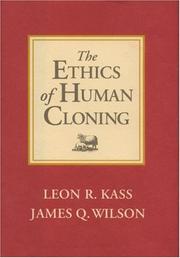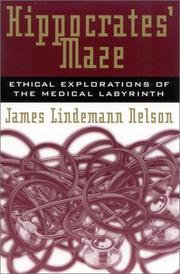| Listing 1 - 2 of 2 |
Sort by
|

Abstract | Keywords | Export | Availability | Bookmark
 Loading...
Loading...Choose an application
- Reference Manager
- EndNote
- RefWorks (Direct export to RefWorks)
Explores the ethics of human cloning, reproductive technology and the teleology of sexuality from two perspectives which both fundamentally distrust the notion of cloning, but for differing reasons. The volume is intended to inform the public policy debate on permissible genetic research. Today, biological science is rising on a wall of worry. No other science has advanced more dramatically during the past several decades, nor yielded so many palpable improvements in human welfare. Yet none except nuclear physics has aroused greater apprehensions among the general public and leaders in such diverse fields as religion, the humanities and government. In this volume, Leon R. Kass, a teacher, scientist and humanist, and James Q. Wilson, a political scientist to whom four US presidents have turned for advice on crime, drug abuse, education and other crises in American life, explore the ethics of human cloning, reproductive technology and the teleology of human sexuality. Although in their dialogue, both authors share a fundamental distrust of the notion of human cloning, they base their reticence on different views of the role of sexual reproduction and the role of the family. Professor Kass contends that in vitro fertilization and other assisted reproduction techniques that place the origin of human life in human hands have eroded the respect for the mystery of sexuality and human renewal. Professor Wilson, in contrast, asserts that whether a human life is created naturally or artificially is immaterial as long as the child is raised by loving parents in a two-parent family and is not harmed by the means of its conception. The volume is intended to inform the public policy debate over the permissible conduct of genetic research and the permissible uses of its discoveries.

ISBN: 0742513858 Year: 2003 Publisher: Totowa Rowman & Littlefield
Abstract | Keywords | Export | Availability | Bookmark
 Loading...
Loading...Choose an application
- Reference Manager
- EndNote
- RefWorks (Direct export to RefWorks)
To contain the Minotaur, the ancient artificer Daedalus crafted a maze so intricate that it bewildered even its maker. Contemporary medicine-'Hippocrates' Maze-is every bit as bewildering, so much so that a new and distinct field, bioethics, has been created to help professional caregivers, patients, and families navigate their way through it. In Nelson's typically inviting and graceful style, the essays collected in Hippocrates' Maze explore the labyrinth of contemporary health care, and arrive at some unusual findings about death and decisionmaking, justice and families, cloning and kinship, and organ donation and intimacy. However, the book's most distinctive conclusions concern bioethics itself: the field is not best seen solely as a source of good advice to doctors, but rather as a way of better understanding our humanity.
bio-ethiek (medische, biomedische ethiek, bio-ethische aspecten) --- filosofie (filosofische aspecten) --- prenatale diagnostiek (prenatale test) --- identiteit --- familie (rol van de familie, familieleden, naasten, verwanten, nabestaanden) --- orgaantransplantatie (allocatie van organen, donorschaarste) --- kloneren (klonen, therapeutisch kloneren, reproductief kloneren) --- bioéthique (éthique médicale, biomédicale, aspects bioéthiques) --- philosophie (aspects philosophiques) --- diagnostic prénatal (test prénatal, DPN) --- identité --- famille (rôle de la famille, membres de la famille, proche parents, dépendants) --- transplantation d'organes (greffe d'organes, pénurie d'organes, allocation d'organes) --- clonage (clonage thérapeutique, clonage reproductif) --- Medical ethics. --- Medical ethics --- Biomedical ethics --- Clinical ethics --- Ethics, Medical --- Health care ethics --- Medical care --- Medicine --- Moral and ethical aspects --- Bioethics --- Professional ethics --- Nursing ethics --- Social medicine
| Listing 1 - 2 of 2 |
Sort by
|

 Search
Search Feedback
Feedback About UniCat
About UniCat  Help
Help News
News